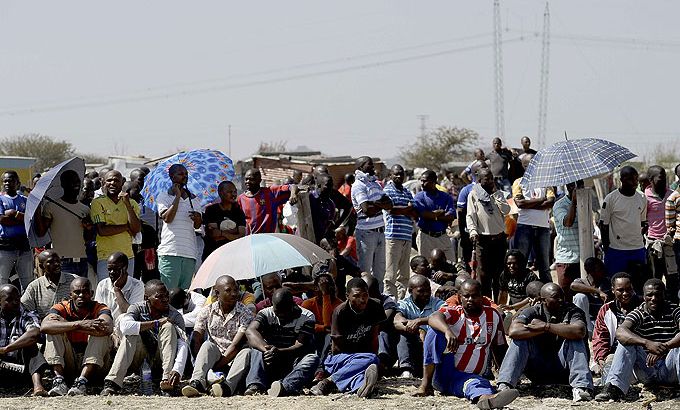Minister apologises to S African mine workers
Defence minister asks mine workers for forgiveness after strike that left 44 people dead, mostly miners shot by police.

South Africa’s minister of defence has apologised to angry miners, the first government official to do so, after police who said they were acting in self-defence shot 34 striking miners dead in clashes that left 10 other people dead.
Police said they opened fire on the miners, who were demanding a 300 per cent pay rise, after they tried to attack them with clubs and machetes on Thursday. At least 78 people were wounded.
“I am begging, I beg and I apologise, may you find forgiveness in your hearts,” Mapisa-Nqakula said on Tuesday in Marikana, the scene of the deaths.
“We agree, as you see us standing in front of you here, that blood was shed at this place. We agree that it was not something to our liking and, as a representative of the government, I apologise.”
Earlier, hundreds of mourners visited the site of the killings, and walking barefoot, conducted a blessing ceremony of the site.
Zuma criticised
Various political parties and political leaders have visited the scene of the incident to pay their respects to the families of the deceased miners.
However, miners on Tuesday echoed criticism from some opposition parties, and on social media, as to why Jacob Zuma, the country’s president, had not yet addressed the strikers.
“If Jacob Zuma doesn’t want to come here, how does he expect to gain our votes,” said one miner to the minister.
Zuma returned to South Africa from a regional summit in neighbouring Mozambique on Friday to deal with the crisis.
He flew directly to Marikana mine and visited wounded miners in the hospital. He did not, however, talk to the strikers.
The government has come under criticism for its handling of the situation after Riah Phiyega, the head of police, said earlier this week that the killings were “the right thing to do”.
However, speaking to Al Jazeera, Ebrahim Fakir, a political analyst with the Electoral Institute of Southern Africa, said that this was not really a question of government policy.
“This was an issue which happened at the level of society, and government did, I think, what it could,” he said.
Strike ultimatum
On Tuesday, Lonmin, the mine operating company, revised for the third time an ultimatum for workers to return to work or face dismissal, after the government intervened.
The government persuaded mine managers not to fire workers during the one week period of mourning declared by the president on Friday.
“Lonmin agrees that no disciplinary action [should] be taken against those unlawfully away from work who do not return this week,” the company said in a statement.
Lonmin had ordered strikers to report for duty by 7am on Tuesday or face dismissal, while some family members were still searching for the loved ones.
Many of the families were still not sure if their loved ones were among those hospitalised, those killed or if they were among 259 protesters still in police custody.
Separately on Tuesday, expelled ANC youth league president Julius Malema and South African mineworkers laid murder charges against the officers involved in the killings of the miners.
About 3,000 rock drill operators, mainly from the Association of Mineworkers and Construction Union (AMCU), started the strike on August 10, calling for higher wages.
They had vowed to continue their strike until their demands were met but negotiations have been strained by an ongoing rivalry between AMCU and a larger rival union.